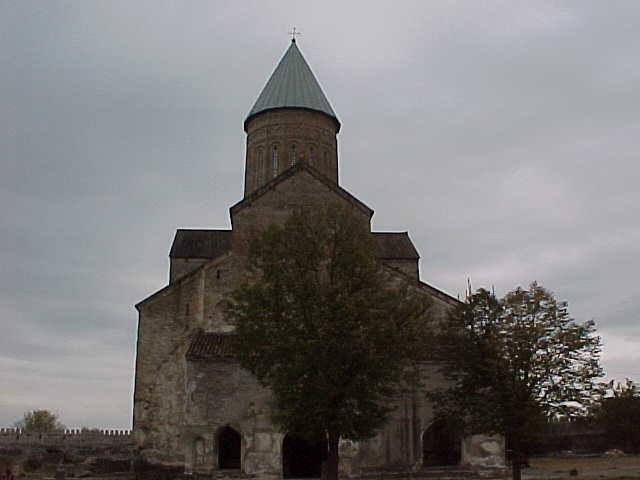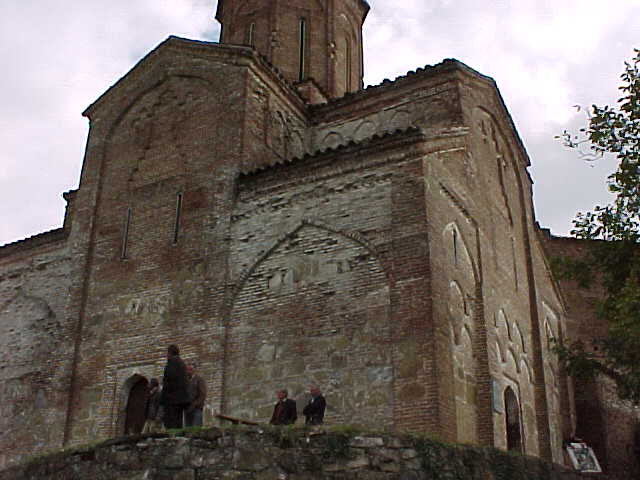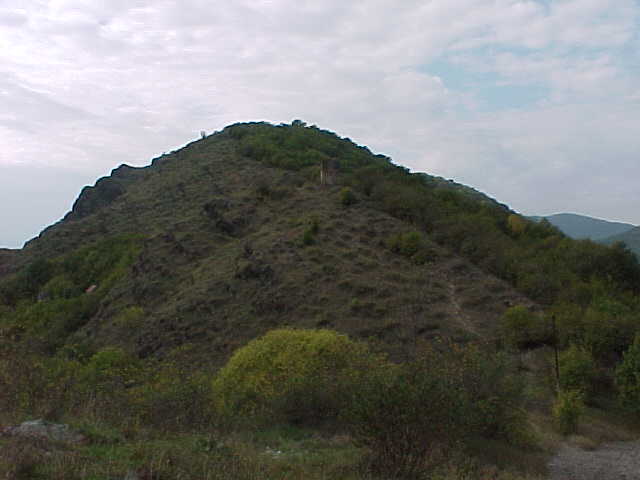October 22—Thursday
We had Matins and Liturgy at the Church, but the Metropolitan did not serve, as Fr. Andrew was still laid up, and it would have been too confusing without him. However, the Metropolitan did give a sermon. We came back and ate, then when straight to Patardzeuli. We got together with the brotherhood and discussed their problems and other important matters for about one and a half hours. They had unanimously decided to have Fr. Kyrion as their abbot, since Fr. Gabriel decided he could not carry on there. Since the Metropolitan did not have any of his service books with him, he asked Fr. Kyrion to come to Tbilisi on Sunday, where he would read the proper prayers for installing him as abbot. We finished about 6:45 and re-turned to Tbilisi.
When we returned, Fr. Otari took me to his apartment. He lives in the same group of apartment buildings as Fr. Zurab, way on the western end of the city. He lives on the sixteenth floor, and when there is no electricity, they have to climb all those stairs. Fortunately there was electricity when we came. He gave me a small tour of his apartment and his workshop. I was very sad to see the condition of his dwelling. Run-down just like everywhere else. This is because people don’t have enough money to keep up their buildings. But, at least it is a place to live. It certainly is spacious enough, even with the five children he has.
He then said he was going to the store, and so I sat and chatted with his wife, Nino. She is a very interesting person. Actually she is a philologist, which means we had common interests to speak about. She gives private lessons in German, which is a very popular language in Georgia.
Fr. Otari returned after a while and brought all kinds of goodies with him. If one thinks I have a sweet tooth, he should see him (while in America, he had told me some of his stories about eating whole tortes at one sitting). Well, we sat and talked about many and various things for a while. I then took pictures of the family, and he took me back to our apartment. I should add that in our conversation, they talked about the high winds that blow in that area, and how their building sways. While we were sitting there, he said, "Look at the chandelier." It was swaying back and forth, which means, the building was moving! They told me about the earthquake they had a few years ago. It came in the middle of the night. Fr. Otari’s wife jumped out of bed and really freaked out, screaming that everyone should get down to the first floor. Fr. Otari wouldn’t get up and just said, "What’s the matter with you! By the time you get down to the first floor, the whole place will collapse anyway. Go back to bed!" In relating it, you could clearly tell her memories of the earthquake still evokes very strong emotions.
Fr. Otari and David
October 23—Friday
At about 10:00 Fathers Zurab and Gelasi came, and we (the Metropolitan and I—Fr. Andrew was still laid up) took off for Alaverdi, which is in the area of Georgia called Kakheti. It was a drive of about two hours. On the way, we passed the village where these fathers were born and grew up. They told us about their parents and their parents’ parents, and how the Communists came in after they took over Georgia. The whole village fought bravely for some time, and the Communists had a very hard time with them. Finally, by treachery and lies they told them they would have a truce and forgive them all and would allow everyone to live peacefully. With this they lured them all back, surrounded them and killed them all (the menfolk, that is). Very sad stories one can hear from these people. . .
Finally, we got to Alaverdi. It is a very ancient church and see. Saint Ketevan’s relics are buried in the sanctuary there, but we did not go in, as the fathers were nervous about the possibility of unpleasant situations. We looked around, took pictures and departed. From this place you can see the mountains in the distance. Beyond them are Chechnya on one end and Daghestan on the other (about 40 miles away). We went on further to Gremi, which was the ancient capital of Kakheti. When we got there, we could see very old ruins of all the buildings, but many, many churches standing all over the place in the midst of these ruins. I asked how it was that the churches lasted so long and not the other buildings. They said that the people kept up the churches throughout all those centuries.


On the way back, we stopped in at their village and visited with their grandmother. She gave us two bottles of Chacha (fire water, like Suma). We stayed for about half an hour and went back. When we returned to our apartment, Fr. John and Dr. Kakha came by. We visited with Fr. John a little, then retired.
